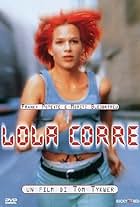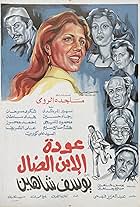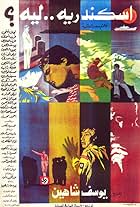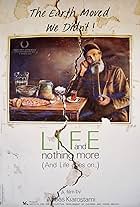
AhmedSpielberg99
Iscritto in data feb 2016
Ti diamo il benvenuto nel nuovo profilo
Stiamo ancora lavorando all'aggiornamento di alcune funzionalità del profilo. Per visualizzare I loghi, le suddivisioni delle valutazioni e i sondaggi per questo profilo, vai a versione precedente.
Valutazioni2031
Valutazione di AhmedSpielberg99
Recensioni389
Valutazione di AhmedSpielberg99
After his father abandoned him, 11-year-old Cyril has his life put into a tailspin. The story starts off as he keeps relentlessly looking for his bike in hope it leads him to his estranged father. I loved how the Dardennes brothers deceived us into thinking that's how the film plays out for the rest of its runtime. It seemed to me that Cyril will just keep on trying to find his father endlessly to no avail. It turns out, however, that's only how the first third of the film is. But, and to Cyril's dismay, his father wants a new life without him as he think he couldn't manage to take care of his child, having seeing him now as a burden. From that point the plot kicks off. From the first scene where he's determined to call his father despite the phone being out-of-service, Thomas Doret is absolutely brilliant as Cyril as he's trying to be in denial of the fact his father moved away. Then, the news came to forlorn Cyril as a shock, and one could tell he's acting out like a brat lest he gets attached to anyone else, first and foremost his caretaker Samantha (Cécile de France) who's the only person who seems to really care about him and worry about his wellbeing.
Cyril saw Samantha as a mother figure; one who's worthy of trusting and who seems ready to contain him, but that's exactly the problem. Hearing the very person whom he depends upon for his survival, distancing himself from him for good. How traumatising that must be for a child; how his sense of self-worth would implode. So, it makes perfect sense Cyril would do his utmost to not have his heart shattered again by someone like his father. I imagine a different or, say, a parallel trajectory to Cyril's story: his pain would be too great, too huge to feel and he would end up repressing it. Over time, he would dissociate the roots of his trauma, but one day he'd visit that pent-up rage upon anyone who's in the place of his father, so long as he himself would be out-of-reach at that point. Luckily, and comparatively, Cyril is a freewheeling and spontaneous kind of a kid - he's 'The Kid with a Bike.' Cyril's rage is instantly let loose. While that's entailed tragic consequences, which the film painfully chronicles, I think they're, more or less, told as a chapter in Cyril's life that's due to take its course to teach him a lesson, and the narrative being registered as a karmic playback asserts this point to a considerable extent.
Similar to what the Dardennes have done with Sandra (Marion Cotillard) in Two Days, One Night, opting for a narrow focus on the Cyril for almost the entire film makes for a thoroughly engaging and affecting experience without diminishing the significance the secondary characters bear. The Dardennes' sensitive direction explores the touchy subject matter with an empathetic simplicity. It's a film full of nuances you can't help but wonder how accurately in its depiction of a child's trauma. Just keep an eye on how Cyril perceives every shock in his devastating life. Also, similar to said film, the handheld cam is used to lend this film a realistic sense, but is chiefly used here to ratchet up the tension after Cyril gets embroiled in a precarious world rife with crime and exploitation. I have no idea why it's taken me so long to check out another Dardennes' film since I adored Two Days, One Night. Plus, this one centres around a boy neglected by his father and having a hard time coping with that new life of his, and a film of that kind is right up my alley. Glad I finally get to around to seeing it nonetheless, and man did I like it! Aside from a few feel-good bromides one expects to find in a story with a moral value like this, The Kid with a Bike is nearly perfect in my book.
Cyril saw Samantha as a mother figure; one who's worthy of trusting and who seems ready to contain him, but that's exactly the problem. Hearing the very person whom he depends upon for his survival, distancing himself from him for good. How traumatising that must be for a child; how his sense of self-worth would implode. So, it makes perfect sense Cyril would do his utmost to not have his heart shattered again by someone like his father. I imagine a different or, say, a parallel trajectory to Cyril's story: his pain would be too great, too huge to feel and he would end up repressing it. Over time, he would dissociate the roots of his trauma, but one day he'd visit that pent-up rage upon anyone who's in the place of his father, so long as he himself would be out-of-reach at that point. Luckily, and comparatively, Cyril is a freewheeling and spontaneous kind of a kid - he's 'The Kid with a Bike.' Cyril's rage is instantly let loose. While that's entailed tragic consequences, which the film painfully chronicles, I think they're, more or less, told as a chapter in Cyril's life that's due to take its course to teach him a lesson, and the narrative being registered as a karmic playback asserts this point to a considerable extent.
Similar to what the Dardennes have done with Sandra (Marion Cotillard) in Two Days, One Night, opting for a narrow focus on the Cyril for almost the entire film makes for a thoroughly engaging and affecting experience without diminishing the significance the secondary characters bear. The Dardennes' sensitive direction explores the touchy subject matter with an empathetic simplicity. It's a film full of nuances you can't help but wonder how accurately in its depiction of a child's trauma. Just keep an eye on how Cyril perceives every shock in his devastating life. Also, similar to said film, the handheld cam is used to lend this film a realistic sense, but is chiefly used here to ratchet up the tension after Cyril gets embroiled in a precarious world rife with crime and exploitation. I have no idea why it's taken me so long to check out another Dardennes' film since I adored Two Days, One Night. Plus, this one centres around a boy neglected by his father and having a hard time coping with that new life of his, and a film of that kind is right up my alley. Glad I finally get to around to seeing it nonetheless, and man did I like it! Aside from a few feel-good bromides one expects to find in a story with a moral value like this, The Kid with a Bike is nearly perfect in my book.
Chinese Roulette is a film fraught with cruelty and downright evil, lurking beneath sinister grins and betrayed by disconcerting laughs, waiting to be inflicted on everyone. Revolving around a married couple who are both having affairs, it's also a film of fraudulence and dishonesty. Just like Frau Kast's reaction after seeing the beggar who's been pretending to be blind all along taking off his glasses, the couple's, Kolbe and Ariane, reaction at seeing each other with their respective lovers is laughter; just jarring laughter, followed by silence and awkward intimacy. Then, themes of questionable and twisted morality are on full display, as we see Fassbinder toying with our views of what's right and wrong regarding fractured marriage and infidelity, while instilling it with a provocatively dark comedic tone in the process.
Michael Ballhaus's camera constantly moves around people, going to and fro and switching the perspectives between them. Often through over-the-shoulder shots, which are predominantly used throughout, we see the four characters perceive each other's feelings while their minds concurrently preoccupied by the same thoughts and concerns. In a Persona-like style, Michael Ballhaus' blocking uses the profile of one actor to cut off the other, so that each two actors of the four seem to occupy the same space at the same time. We also get shots through glass and see-through objects, and doors unlocked or left ajar. Yet, and as Angela says, "Eavesdroppers often hear the false truth," what our characters see in, or hear about, each other couldn't be further from the truth, which is demonstrated by shallow, medium close-up shots, where a certain character is showcased in crisp focus and from the chest up, yet somewhat also noticeably distant.
"In their hearts, they blame me for their messed-up lives." In a world where love is neither important nor fulfilling, and marriage is as brittle as glass, it is hardly surprising that it has stony-hearted and awfully terrible parenting. The cheating spouses' daughter, Angela - who's disabled, walking with crutches - has one of the revoltingly cruelest mother-daughter relationships I've seen depicted in film. Nothing comes close to it save for the one in Autumn Sonata. However, in Bergman's film, mistreatment and neglect built up a charge over the years, exploding in the form of spitefully hurtful remarks, whereas here we're witnessing the build-up, displayed growing in silent insinuations, until eventually blowing up - at the wrong target. In the climactic protracted sequence of the titular guessing game, the film contorts itself into a game of allusions to the characters' identities. This is where the film is at its most suffocating and claustrophobic despite the plenty of room given to decipher each enigmatic character. Personally, I feel that what's revealed about them leaves much to be desired, but that's perhaps its intended purpose. Hence, the ambiguous ending.
It's insane how every main character in Chinese Roulette is hateful and despicable. Like, there's not a single one of them that could be called 'nice'. Nevertheless, it's easy to understand their deeds and comprehend their feelings. They feel like flawed, real people; incredibly horrible but real. Neither the husband nor the wife shows a visible sign of remorse whether towards one another or their daughter. Instead, they couldn't care less about any of these matters, and their actions appear to be solely driven by lust or unabashedly ruffling each other's feathers. Though undoubtedly a victim of a dysfunctional family and one whose only outlet to speak is through sign language with her governess, Trauntiz, Angela herself certainly ain't no angel. She even has some sort of a malevolent omniscient ability, enabling her to see through the rest of the characters and ultimately seems to have the upper hand on them. That's not mentioning there's a clear sense of creepiness about her, symbolised by her dolls. Kast is a cranky old woman confined to household chores who looks at anyone with a jaundiced eye, Gabriel Kast is a murky character trapped in adolescence and adulthood. He's the only one besides Angela, however, who seems to seek the truth, which explains the odd bond between the two of them.
Chinese Roulette is a bleak and distressing chamber piece that demands contemplation, but it's surprisingly accessible due to the stylish camera work and fleshed-out, if deliberately vague, characters. Set in a world of heinous people hiding their deep-rooted nastiness with lies and silence, the film shows an edifice of fascism of family, which they built, coming down upon them. Chinese Roulette also has a warped sense of humour at play, manifested in its absurdist undertones, and further reinforced by a light classical music. It's a film that doesn't stop at seeing the parents' failures paid for by the children, and decides to offer them a chance to revenge themselves in the most wicked of ways. Crude, cold and intellectual, my first Fassbinder sure won't be the last and most likely would serve as a springboard into his filmography.
Michael Ballhaus's camera constantly moves around people, going to and fro and switching the perspectives between them. Often through over-the-shoulder shots, which are predominantly used throughout, we see the four characters perceive each other's feelings while their minds concurrently preoccupied by the same thoughts and concerns. In a Persona-like style, Michael Ballhaus' blocking uses the profile of one actor to cut off the other, so that each two actors of the four seem to occupy the same space at the same time. We also get shots through glass and see-through objects, and doors unlocked or left ajar. Yet, and as Angela says, "Eavesdroppers often hear the false truth," what our characters see in, or hear about, each other couldn't be further from the truth, which is demonstrated by shallow, medium close-up shots, where a certain character is showcased in crisp focus and from the chest up, yet somewhat also noticeably distant.
"In their hearts, they blame me for their messed-up lives." In a world where love is neither important nor fulfilling, and marriage is as brittle as glass, it is hardly surprising that it has stony-hearted and awfully terrible parenting. The cheating spouses' daughter, Angela - who's disabled, walking with crutches - has one of the revoltingly cruelest mother-daughter relationships I've seen depicted in film. Nothing comes close to it save for the one in Autumn Sonata. However, in Bergman's film, mistreatment and neglect built up a charge over the years, exploding in the form of spitefully hurtful remarks, whereas here we're witnessing the build-up, displayed growing in silent insinuations, until eventually blowing up - at the wrong target. In the climactic protracted sequence of the titular guessing game, the film contorts itself into a game of allusions to the characters' identities. This is where the film is at its most suffocating and claustrophobic despite the plenty of room given to decipher each enigmatic character. Personally, I feel that what's revealed about them leaves much to be desired, but that's perhaps its intended purpose. Hence, the ambiguous ending.
It's insane how every main character in Chinese Roulette is hateful and despicable. Like, there's not a single one of them that could be called 'nice'. Nevertheless, it's easy to understand their deeds and comprehend their feelings. They feel like flawed, real people; incredibly horrible but real. Neither the husband nor the wife shows a visible sign of remorse whether towards one another or their daughter. Instead, they couldn't care less about any of these matters, and their actions appear to be solely driven by lust or unabashedly ruffling each other's feathers. Though undoubtedly a victim of a dysfunctional family and one whose only outlet to speak is through sign language with her governess, Trauntiz, Angela herself certainly ain't no angel. She even has some sort of a malevolent omniscient ability, enabling her to see through the rest of the characters and ultimately seems to have the upper hand on them. That's not mentioning there's a clear sense of creepiness about her, symbolised by her dolls. Kast is a cranky old woman confined to household chores who looks at anyone with a jaundiced eye, Gabriel Kast is a murky character trapped in adolescence and adulthood. He's the only one besides Angela, however, who seems to seek the truth, which explains the odd bond between the two of them.
Chinese Roulette is a bleak and distressing chamber piece that demands contemplation, but it's surprisingly accessible due to the stylish camera work and fleshed-out, if deliberately vague, characters. Set in a world of heinous people hiding their deep-rooted nastiness with lies and silence, the film shows an edifice of fascism of family, which they built, coming down upon them. Chinese Roulette also has a warped sense of humour at play, manifested in its absurdist undertones, and further reinforced by a light classical music. It's a film that doesn't stop at seeing the parents' failures paid for by the children, and decides to offer them a chance to revenge themselves in the most wicked of ways. Crude, cold and intellectual, my first Fassbinder sure won't be the last and most likely would serve as a springboard into his filmography.




























